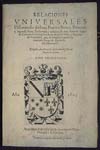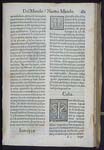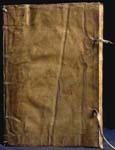Botero, Giovanni.
Relaciones Universales del Mundo de Juan Botero. . . Valladolid: Fernandez de Cordoua, 1603. 110 leaves. This large, quarto volume is bound with the original limp vellum, with ties. The vellum is somewhat discolored, although the volume is otherwise clean and in good condition.



This volume is a reissue, with a cancelled title, of the first Spanish edition of Botero's famous world history, originally published in Italy in 1591-92. Of copies issued with different quantities of maps, those copies with five maps are exceedingly rare. Borba de Moraes, who does call for the maps (and miscollates the book) says, "The Spanish translation is rare." This Spanish translation, published in 1603, contains two parts, both of which are preceeded with a detailed, alphabetical list of the subjects covered in each volume. Each part of the book is separately paginated, with the pages numbered on the recto side of each page, and each entire leaf counting as a page. The first section of the volume contains descriptive material on the cities and countries found on the continents of: Asia, Africa, North America, South America, and various islands. A large part of the work is devoted to the world outside Europe, especially the East and West Indies. The New World portion appears on leaves 134-204 of this first section. Botero includes new discoveries in the Pacific, as well as in the Americas. Mention is made of Norumbega, Florida, Mexico, California and "Quivera," the coasts of Central and South America, the Straits of Magellan, Peru and various Pacific Islands, including Japan.
Botero, one of the greatest economists and political writers of the 16th century, composed in this work the best geography of his time. In a 1630 English translation of Relaciones, the editor writes in the preface: "That this Author hath beene so carefully translated into the Latine, Spanish, French and English languages, is a concluding argument (to me) that no man of those Nations hath hitherto written so well in this Argument: else, what needed they to translate him?" Botero describes the different countries of the world, and supplies important statistical information. Again from the English translation preface: "Our author deserves rather to bee numbred among Politicians, than amongst Historians or Geographers. Tis to his purpose sometimes to deliver you the situation of the country he discourses upon; so to shew you, first the Greatnesse of each Kingdome: Secondly, how formidable or helpfull each Prince is likely to prove his neighbor.... Thirdly, wee hence learne, how suddenly either Forces or Merchandizes may bee transported form one Nation to another."
Botero is best known for his 1589 treatise entitled Reasons of State and the Greatness of Cities. In it he refutes Machiavelli's view of political morality, and argues for a state based on Christian principles. The second part of the book is an early treatise on town-planning, including discussions of what is now termed economic geography. Both of these works are felt to represent the spirit of the "new learning" or "new thought" of the Renaissance.